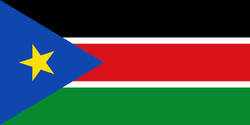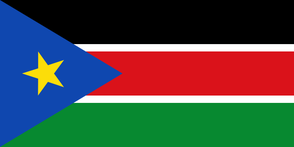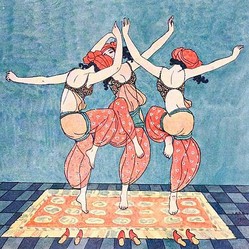
Founding of South Sudan as a New Nation in 2011
by Ping
Historical background and future impact of the breakup of Africa's largest country and the aftermath of a long-term war.
Background of Atrocity
Religions, Slavery, and War
Sudan as a nation has been my interest for a number of years, because a church I attend sends doctors and aid volunteers to that country every year. In partnership with another large congregation, it sends a freighter ship of medical personnel and supplies as well as food and clothing to Sudan. This has been a particular mission of these churches for a decade or more.
Sudanese that admitted they are Christians during a long-term war and slave-taking were rewarded by the opposition with suffering their arms cut off at the shoulders and enslavement afterwards - men, women, and children. All this is in addition to the most recent Civil War between North and South that lasted from 1983 to a treaty in 2005 that allowed for southern independence by election in 2011.
The American churches were part of a movement to stop that atrocity. Members of large churches sent volunteers to purchase the freedom of slaves over the course of several years, often in time to prevent the forcible removal of the arms of Believers. The cost was insignificant to many Americans - about $40.00 USD for each person. We only prayed that these freed people would not be recaptured.
Summing up the struggles of Sudan and South Sudan, the Honorable Atem Garang de Kuek, former Deputy Speaker of the Sudan National Assembly from September 2005 to March 2011 wrote about South Sudan on www.NewSudanVision.com on July 10, 2011. He summarized 190 years of northern Sudan Muslim oppression and enslavement of southern Sudan non-Muslims. He praised God for the victory of the South over these struggles and the ultimate win by the Sudanese People's Liberation Movement of the South against Sudan from 1983 - 2011.
South Sudan
Capital City: Juba
Independence Day July 9, 2011
Independence and An Oil Glut
South Sudan, largely a nation of Christian people, became officially the 54th country on the continent of Africa on July 9, 2011 and Juba its capital city. President Salva Kiir called sovereignty a dream come true for the people.
South Sudan possesses remarkable reserves of untapped oil, but is industrially undeveloped and unable to capture and process them. Southern oil has always been transported through the pipelines of Sudan to the north and this presents a political problem after the national split. With Sudan's pipelines still be used by South Sudan, will the oil arrive to its intended destinations, and will the South receive oil monies due them? The newer nation may become the target of new attacks and schemes designed to obtain their oil.
The South Sudanese economy needs to diversify from its 98% dependence on oil, especially since Sudan owns the oil pipelines. Loss of pipeline use will close down the South Sudanese nation. Nigeria experienced an oil glut in the1970s and, not developing other industries like agriculture further, suffered when the oil supplies began to decline. South Sudan may perhaps learn survival from Nigerian oil history and diversify into large farming operations in a fertile and rain-rich land. The European Union pledged an almost matching aid amount to the $300,000,000 USD already spent in South Sudan to help the new country develop infrastructure with which attract investors. Some foreign investors have already purchased land in recent years and developed small mining and timber industries.
Almost all of the 500,000 barrels of oil produced in Sudan and South Sudan originate in the South. If the North seizes control of the oil and refuses to split profits, South Sudan may die. The president of Sudan, Omar al-Bashir, is wanted by the International Court for war crimes, but still appears in public to ask North and South to cooperate. This plea is likely a ploy and a hope to keep the oil flowing. Further, July 10, 2011 brought news of a Sudanese bombing of the Nuba Mountains in a bid to depopulate that region and rid it of South Sudanese supporters and civil war allies. Oil and war continue to reveal themselves as difficulties.
This is all recognized not only by the United Nations in offering words of caution to the North and South, but also by the United States, whose representative to the UN, Susan Rice, offered reminders of difficulties ahead and called USA the "oldest democracy in the world" as she welcomed South Sudan as the newest. The reference is, of course, incorrect, because the Native Americans' Iroquois Confederacy is the oldest democracy in the Western Hemisphere - much older than the USA by centuries. Regardless, America (who invested $300 Million already) warns that relations between Sudan and South Sudan may inflame at any time.
South Sudanese Soccer
South Sudanese men played a happy football (soccer) match against Kenya to celebrate their new Independence Day and this leads to plans for entering the London 2012 Summer Olympics. This is a healthy sign of a new nation coming alive.
A series of steps must be taken for athletes from South Sudan to qualify under their own flag, including UN recognition of the new nation and several more turns round the IOC. If time runs out, the athletes may compete under the Olympic Flag. The future will be interesting to watch and see which sports and players South Sudan brings to the 2012 Games.
Godspeed, South Sudan.
Sudan
 |  |  |
| First Raise a Flag: How South Sudan W... Oxford University Press | Sudan's Unfinished Democracy: Sub Tit... Hurst Publishing | War and Genocide in South Sudan Cornell University Press Only $0.0 |
You might also like
1001 Arabian Nights: The Stories Behind the Story1001 Nights, for many more known as Arabian Nights is one of most popular col...
Three Men Who Influenced EnglandThree men had a great influence on early England, and their influence can be ...




 Discounts Eliminated for Senior Citizenson 06/15/2015
Discounts Eliminated for Senior Citizenson 06/15/2015
 Healthcare Problems Before and After the Affordable Care Acton 07/05/2012
Healthcare Problems Before and After the Affordable Care Acton 07/05/2012
 Checking Employment References - How Far Should Employers Go?on 07/21/2011
Checking Employment References - How Far Should Employers Go?on 07/21/2011
 Personal and Professional Profileon 07/02/2011
Personal and Professional Profileon 07/02/2011


Comments
You're right! I read yesterday that the UN is already removing their 7,000 peacekeeping forces from South Sudan. This already sounds dangerous for SS, what with the Nubian bombings. Thanks for your comment!
Very interesting on a subject I know very little about. Gruesome at some points. But the reality of this world we live in is hard to take sometimes.